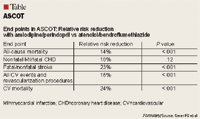- Safety & Recalls
- Regulatory Updates
- Drug Coverage
- COPD
- Cardiovascular
- Obstetrics-Gynecology & Women's Health
- Ophthalmology
- Clinical Pharmacology
- Pediatrics
- Urology
- Pharmacy
- Idiopathic Pulmonary Fibrosis
- Diabetes and Endocrinology
- Allergy, Immunology, and ENT
- Musculoskeletal/Rheumatology
- Respiratory
- Psychiatry and Behavioral Health
- Dermatology
- Oncology
Calcium antagonist has clinical advantage over beta-blocker as initial antihypertensive therapy
An antihypertensive therapeutic strategy that starts with the calcium antagonist amlodipine is superior to one starting with the beta-blocker atenolol in preventing coronary heart disease (CHD) events, Peter S. Sever, MD, reported at the ACC Annual Scientific Session 2005.
An antihypertensive therapeutic strategy that starts with the calcium antagonist amlodipine is superior to one starting with the beta-blocker atenolol in preventing coronary heart disease (CHD) events, Peter S. Sever, MD, reported at the ACC Annual Scientific Session 2005.
He presented the results of a clinical trial known as ASCOT (Anglo-Scandinavian Cardiac Outcomes Trial), which was stopped prematurely on the advice of the trial's Data Safety Monitoring Board because of the magnitude of difference in the incidence of clinical events between the 2 treatment regimens.

The findings that were presented represent 95% of the final data, and the conclusions are not expected to change at the final follow-up, said Dr Sever.
The trial was stopped after an average follow-up of 5.5 years, at which time the composite end point of nonfatal MI or fatal CHD occurred in 10% fewer patients randomized to amlodipine/perindopril compared with atenolol/ bendroflumethiazide; however, this result did not reach statistical significance (P=.12).
"If the trial had gone along to the planned number of events... that relative reduction might have become significant," said Dr Sever. The study was powered to achieve significance with 1,150 events but was terminated after only 869 events.
Amlodipine/perindopril was associated with significant relative reductions in all-cause mortality (14%, P<.001), stroke (23%, P<.001), cardiovascular death (24%, P<.001), cardiovascular events and procedures (16%, P<.001), and total coronary events (14%, P=.005).
The significant reduction in mortality was a surprise, Dr Sever said, given the small sample size. "It's certainly a finding we would not have predicted because the trial wasn't powered for all-cause mortality," he said.
As expected, the beta-blocker/diuretic regimen was associated with a 32% excess in the development of new diabetes. "Something about this drug combination induces diabetes, and this is not good news at all, given the worldwide epidemic of diabetes," Dr Sever said.
The differences in event rates between the 2 arms should not be attributed to the initial drugs, he said. "The trial was designed to look at a treatment strategy rather than an individual drug because we recognize that most people with high blood pressure require at least 2 drugs to achieve target pressures," he said. Only 14.3% of the patients started on amlodipine and 8.6% of those started on atenolol finished on monotherapy.
In agreement was Richard Devereux, MD, professor of medicine, Weill Medical College of Cornell University, New York, NY, who noted the high use of diuretics in the beta-blocker arm (67%) and perindopril in the amlodipine arm (63%) as evidence that the effects cannot "solely be attributed to the initial drug in either arm."
Coalition promotes important acetaminophen dosing reminders
November 18th 2014It may come as a surprise that each year Americans catch approximately 1 billion colds, and the Centers for Disease Control and Prevention estimates that as many as 20% get the flu. This cold and flu season, 7 in 10 patients will reach for an over-the-counter (OTC) medicine to treat their coughs, stuffy noses, and sniffles. It’s an important time of the year to remind patients to double check their medicine labels so they don’t double up on medicines containing acetaminophen.
Support consumer access to specialty medications through value-based insurance design
June 30th 2014The driving force behind consumer cost-sharing provisions for specialty medications is the acquisition cost and not clinical value. This appears to be true for almost all public and private health plans, says a new report from researchers at the University of Michigan Center for Value-Based Insurance Design (V-BID Center) and the National Pharmaceutical Council (NPC).
Management of antipsychotic medication polypharmacy
June 13th 2013Within our healthcare-driven society, the increase in the identification and diagnosis of mental illnesses has led to a proportional increase in the prescribing of psychotropic medications. The prevalence of mental illnesses and subsequent treatment approaches may employ monotherapy as first-line treatment, but in many cases the use of combination of therapy can occur, leading to polypharmacy.1 Polypharmacy can be defined in several ways but it generally recognized as the use of multiple medications by one patient and the most common definition is the concurrent use of five more medications. The presence of polyharmacy has the potential to contribute to non-compliance, drug-drug interactions, medication errors, adverse events, or poor quality of life.
Medical innovation improves outcomes
June 12th 2013I have been diagnosed with stage 4 cancer of the pancreas, a disease that’s long been considered not just incurable, but almost impossible to treat-a recalcitrant disease that some practitioners feel has given oncology a bad name. I was told my life would be measured in weeks.
